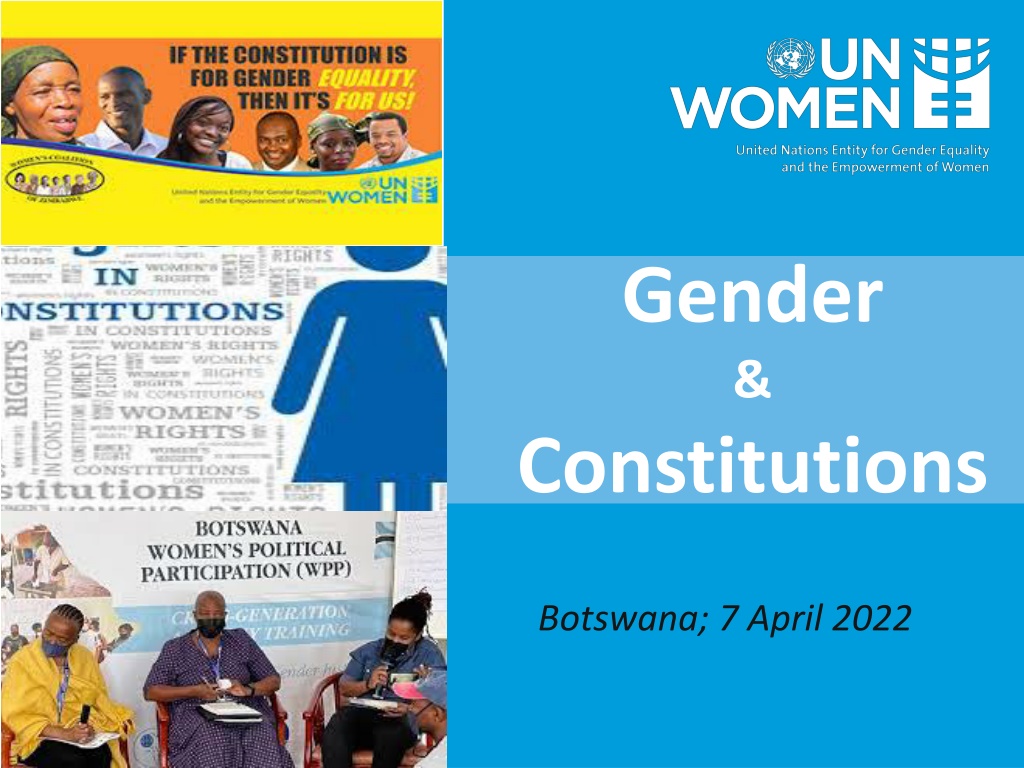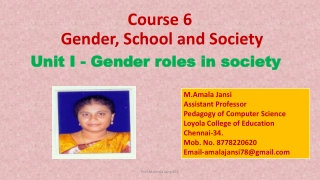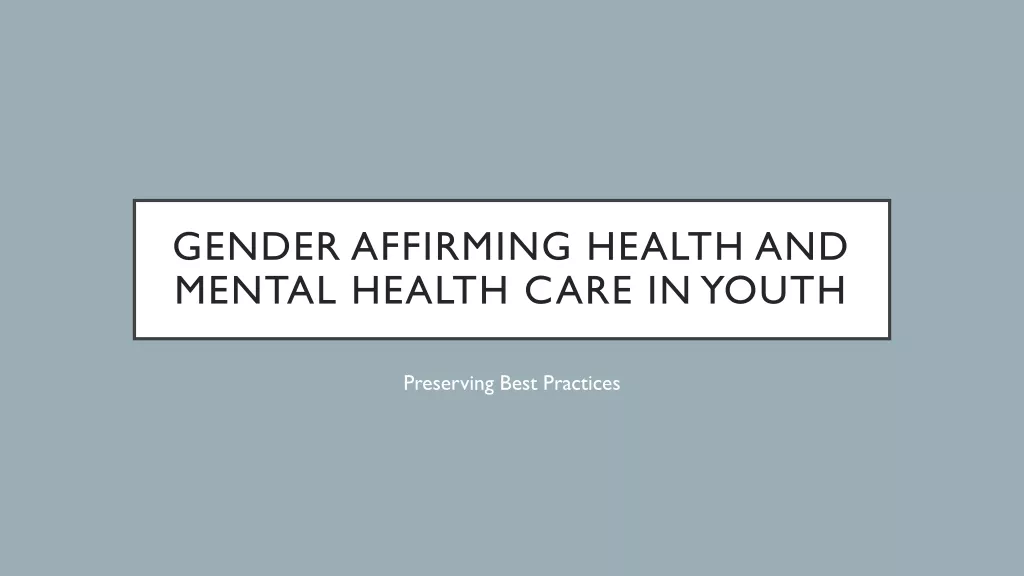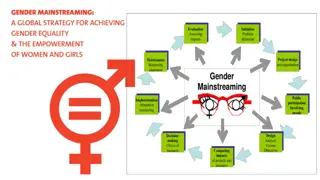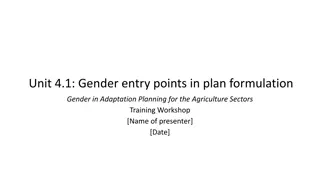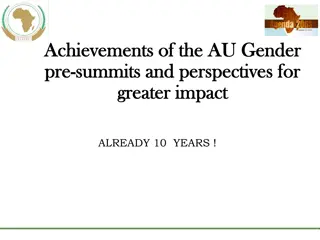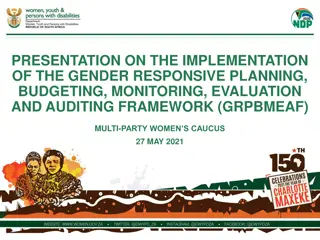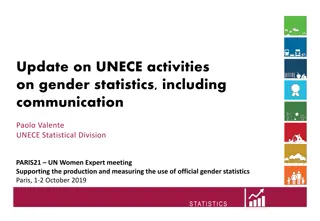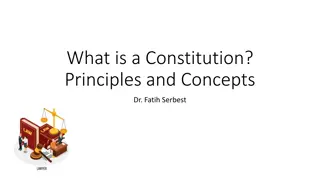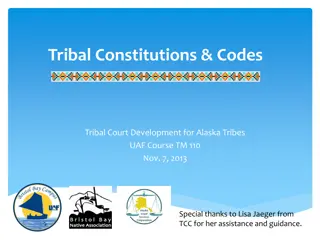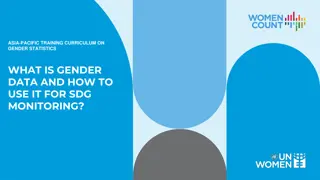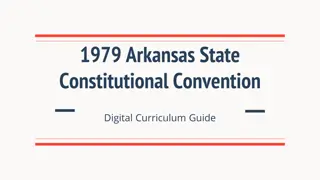Gender and Constitutions: Key Insights and Policy Implications
Constitutions play a pivotal role in shaping systems of governance and accountability, presenting opportunities as well as challenges for advancing gender equality. A shift towards gender-specific language in constitutional content has been observed globally since the 1980s. Examples from countries like South Africa and Ecuador demonstrate how constitutional reforms can stimulate legislative changes and promote women's rights. However, there are persistent gaps in gender-responsive provisions, emphasizing the need for strategic collaborations between state and non-state actors to address discriminatory provisions and ensure substantive equality.
Download Presentation

Please find below an Image/Link to download the presentation.
The content on the website is provided AS IS for your information and personal use only. It may not be sold, licensed, or shared on other websites without obtaining consent from the author. Download presentation by click this link. If you encounter any issues during the download, it is possible that the publisher has removed the file from their server.
E N D
Presentation Transcript
Gender & Constitutions Botswana; 7 April 2022
Presentation Outline Importance of Constitutions analysis of UN Women s constitutional database Challenges, gaps and policy implications Examples of UN Women Support Recommended additions to the Constitution of Botswana
Importance of Constitutions Constitutions are the most authoritative expressions of States systems of governance and accountability and therefore pose potential opportunities for and threats to the advancement of gender equality. Constitutions serve as effective triggers of legislative and policy change in support of gender equality, provided opportunities and entry points afforded by post-constitutional reforms are fully exploited and resources are made available for such purposes. Provide opportunities to recognize minorities Since the 1980s, constitutional content has evolved from gender-neutral to the gender-specific language - Africa, Asia and the Americas account for most of the identifiable gender-related constitutional reforms across this timeframe.
Importance of Constitutions Limited data from some countries demonstrates the value of constitutions as tools of change. e.g., The South African Constitution provided significant impetus for a wave of legislative reforms that address gender discrimination (e.g., the Promotion of Equality Act, the Labor Relations Act, the Prevention of Family Violence Act, the Choice on Termination of Pregnancy Act, the Maintenance Act and the Films and Publications Act).28 In Ecuador, a number of national studies on women s time use, the feminization of poverty, domestic chores and unpaid labour as well as the 2007 Quito regional conference on women in Latin America and the Caribbean served as important catalysts for promoting constitutional provisions on unpaid care work. Such provisions and the forces that had promoted them led to far-reaching commitments to legal and policy change, starting with the National Plan for Good Living (2009 2013). Overall, constitutional reforms have implied major gains for women s rights through a broad range of widespread and emerging provisions. Success in gender-responsive provisions has resulted from strategic alliances between state and non-state actors, particularly women s groups. However, these gains sometimes mask the deficits in constitutional reform, particularly as seen in the persistence of discriminatory provisions.
Analysis of UN Womens constitutional database Areas that are important for women s rights and gender equality. Most constitutions include general provisions on equality and non-discrimination, many have additional gender equality provisions related to, for example, protection from violence, access to education or political quotas (see Figure 1). Some constitutional reform processes have also been accompanied by a quest for specific changes in language. The constitutions of Ecuador and South Africa represent promising examples of constitutional commitment to substantive equality: The former makes express reference to substantive equality while the latter embraces a unique blend of excluded grounds of discrimination e.g., pregnancy, marital status, sex, gender and sexual orientation). The deliberate use of pronouns (he and she, man and woman) in constitutions such as those of Ethiopia, Morocco and Tunisia is a subtle acknowledgement that constitutional language functions to reorder and reconfigure society
Challenges, gaps and policy implications Despite progress, several challenges and gaps in constitutional reform remain (UN Women s constitutional database) Lack of ongoing financial and technical support for post-constitutional reforms e.g., Jagwanth and Murray point to the under-resourced capacity of the South African Gender Equality Commission established under the Constitution. 84% of constitutions contain provisions that relate to the status of customary or religious law the CEDAW committee has expressed concern about the potential impact of religion and custom on women s rights, including through the reservations on women s personal law and non-discrimination. Relatedly, 11 constitutions reflect claw back clauses , which allow exceptions to non-discrimination clauses in matters of personal law particularly marriage, divorce, adoption and inheritance which then tends to water down the positive entry points that non-discrimination clauses present for eliminating discrimination against women in law and in practice. 98 constitutions that reference the right to citizenship/nationality, 14 do not provide women with equal rights to men to acquire change, transfer or retain their nationality. However, the new constitution of Nepal is a key milestone of the Peace Agreement and includes several gender-responsive provisions establishment of the National Women s Commission as a constitutional body. Retention of provisions (e.g., on citizenship) that are not consistent with the CEDAW Committee s Concluding Observations.
Examples of UN Women Support UN Women proactively supports constitutional reform processes and constitutional design from many fronts. Advocacy for the inclusion of women in constitutional review bodies and constitutional courts. Once these bodies are established, technical support is provided to chairperson and members to ensure that gender is mainstreamed throughout the deliberations and decision-making by placing a senior gender expert on location for the entire duration of the reform process - Sierra Leone, Liberia, Syria, Iraq, Tunisia and Libya, among others. Once the reform process is in motion, UNW advocates for the inclusion of women and women s organizations and coalitions in the constitutional deliberations and facilitate their effective participation. E.g. In Somalia, UNW supported the Women s Convention which brought together over 300 Somali women from across the country to design the Somali Women Charter which demanded the inclusion of women s rights in the constitution, the electoral laws and furthermore called for 50-50 representation of women and men at all levels of governance, zero tolerance for gender- based violence, the passage of pending Sexual Offences legislation, and the promotion and protection of women s socio-economic rights.
Examples of UN Women Support Support inclusion and participation by the most marginalized groups Support in Sierra Leone targeted the participation of rural women. UN Women mobilized and facilitated the engagement of women to ensure their voices were heard during the Ebola epidemic. Under the slogan let us talk, UN Women organized two rounds of consultations, capturing the voices of over 6,000 women located in the remotest parts of the country. These consultations were used to educate them on the constitutional review process and the gender equality dimensions of the existing 1991 Constitution. UN Women then documented the women s views on what they wanted to see in a new Constitution and their views and aspirations were collated into a historic Women s Charter that was submitted to the Constitutional Review Committee.
Examples of UN Women Support Support is all inclusive including working with women politicians across party lines. In Nepal and Zimbabwe, - a core group of women formed themselves into the G20 and submitted one message on women s priorities to the constitutional review body. Included was the women s caucus of Parliament which consisted of women from all political parties. In recent times; UNW has also worked with civil society organizations to prepare amicus briefs and submissions on the constitutionality of specific violations of women s rights. In Tanzania UNW supported the submission of a public interest litigation on the constitutionality of early and child marriage. Similarly, in Kosovo, the constitutional court granted an application for the amendment of the Constitution s article 22 to include the Istanbul Convention in the list of directly applicable international legal instruments for protection of human rights.
Recommended additions to the Constitution of Botswana Introduction of entirely new gender equality language Provisions on affirmative action The 2030 Agenda framework provides a useful framework for introducing language on leave no one behind. See the following examples: Nepal: (4) Women shall have the right to participate in all bodies of the State on the basis of the principle of proportional inclusion. (5) Women shall have the right to obtain special opportunity in education, health, employment and social security on the basis of positive discrimination. (Art. 38) Georgia: 3. The State shall provide equal rights and opportunities for men and women. The State shall take special measures to ensure the essential equality of men and women and to eliminate inequality. (Art. 11)
Recommended additions to the Constitution of Botswana Provisions on quotas: Egypt The House of Representatives is composed of no less than four hundred and fifty members elected by direct secret public ballot. At least one quarter of the seats shall be allocated to women. (Art. 102) Rwanda The Chamber of Deputies is composed of eighty (80) Deputies. They originate and are elected from the following categories: fifty-three (53) Deputies elected from a fixed list of names of candidates proposed by political organisations or independent candidates elected by direct universal suffrage based on proportional representation; twenty- four (24) women elected by specific electoral colleges in accordance with the national administrative entities; two (2) Deputies elected by the National Youth Council; one (1) Deputy elected by the National Council of Persons with Disabilities. At least thirty percent (30%) of Deputies must be women. (Art. 75)
Recommended additions to the Constitution of Botswana Provisions for national women s machineries South Africa The Commission for Gender Equality must promote respect for gender equality and the protection, development and attainment of gender equality. 1. The Commission for Gender Equality has the power, as regulated by national legislation, necessary to perform its functions, including the power to monitor, investigate, research, educate, lobby, advise and report on issues concerning gender equality. 2. The Commission for Gender Equality has the additional powers and functions prescribed by national legislation. (Sec. 187) 3.
Recommended additions to the Constitution of Botswana Human rights bodies France: The Defender of Rights shall ensure the due respect of rights and freedoms by state administrations, territorial communities, public legal entities, as well as by all bodies carrying out a public service mission or by those that the Institutional Act decides fall within his remit. Referral may be made to the Defender of Rights, in the manner determined by an Institutional Act, by every person who considers his rights to have been infringed by the operation of a public service or of a body mentioned in the first paragraph. He may act without referral. The Defender of Rights shall be appointed by the President of the Republic for a six- year, non-renewable term, (1958 Constitution, Art. 71-1)
Recommended additions to the Constitution of Botswana Protection from violence: Norway: No one may be subjected to torture or other inhuman or degrading treatment or punishment. No one shall be held in slavery or required to perform forced labor. The authorities of the State shall protect the right to life and oppose torture, slavery, forced labor and other forms of inhuman or degrading treatment. (Art. 93)
Recommended additions to the Constitution of Botswana Standalone provisions on women s rights: Ethiopia: Women shall, in the enjoyment of rights and protections provided for by this Constitution, have equal right with men. Women have equal rights with men in marriage as prescribed by this Constitution. The historical legacy of inequality and discrimination suffered by women in Ethiopia was taken into account, & women, in order to remedy this legacy, are entitled to affirmative measures. The purpose of such measures shall be to provide special attention to women so as to enable them to compete and participate on the basis of equality with men in political, social and economic life as well as in public and private institutions. The State shall enforce the right of women to eliminate the influences of harmful customs. Laws, customs and practices that oppress or cause bodily or mental harm to women are prohibited.
Recommended additions to the Constitution of Botswana Standalone provisions on women s rights: Ethiopia (cont d): Women have the right to maternity leave with full pay. The duration of maternity leave shall be determined by law considering the nature of the work, the health of the mother and the well- being of the child and family. Maternity leave may, in accordance with the provisions of law, include prenatal leave with full pay. Women have the right to full consultation in the formulation of national development policies, the designing and execution of projects, and particularly in the case of projects affecting the interests of women. Women have the right to acquire, administer, control, use and transfer property. In particular, they have equal rights with men with respect to use, transfer, administration and control of land. They shall also enjoy equal treatment in the inheritance of property. Women shall have a right to equality in employment, promotion, pay, and the transfer of pension entitlements. To prevent harm arising from pregnancy and childbirth and in order to safeguard their health, women have the right of access to family planning education, information and capacity. (Art. 35)
OTHER RECOMMENDATIONS Ensure women s full and equal participation in processes of constitutional review and reforms in all contexts, e.g., post-conflict and development Leverage the opportunity for cross-country learning by showcasing positive experiences of gender-responsive constitution-making, particularly in relation to eliminating persistent discriminatory constitutional provisions Provide sufficient resources for post-constitutional policy and legislative processes to leverage constitutional enforcement and implementation. In particular, Constitutions must serve as tools for challenging and eliminating gender discriminatory laws as defined by Sustainable Development Goal 5.1 Support gender-responsive public interest litigation by equipping relevant actors to build on achievements in successful gender equality-related litigation. This must be accompanied by continuous efforts to assess the impact of court decisions on women more broadly and strategies that have been and can be used for scaling up such benefits Conduct further research into the wider impacts of gender-responsive constitutional reforms to serve as a basis for strategic uses of constitutions as instruments of transformative change for women among a wide range of audience
The role of constitutional jurisprudence in advancing gender equality The strong will and tenacity of civil society groups to actively engage in public interest litigation has contributed to the reform of gender discriminatory laws. Women s groups in Colombia have utilized such forums to protect women from conflict-related violence and displacement. Women have used their national constitution to protest the desecration of sacred land in Australia, police failure to warn about a serial rapist in Canada, forcing contraceptives on female prisoners as a condition of conjugal visits in Colombia, gendered prayer rights in Israel, the restitution of conjugal rights in India, the order of family names in Germany and male preference rules in the inheritance of nobility titles in Spain.
The role of constitutional jurisprudence in advancing gender equality Though rarely documented, here are some wider impacts of constitutional jurisprudence The 1995 case of 19-year-old Adriana Granados, who filed a claim for the right of admission to the navy in the constitutional court of Colombia, paved the way for the enrolment of the first 28 women cadets. In 1997, 34 women joined the air force as pilot trainees and 20 entered the naval officers training school, while military installations have been adapted to provide private lodging, separate bathrooms, pregnancy tests and maternity uniforms. The Supreme Court of Nepal annulled a provision in the criminal code that exempted husbands from marital rape. The case of Unity Dow v. Attorney General of Botswana led to the repeal of the Citizenship Act, which had denied women the right to pass on their nationality to their foreign husbands and children of the marriage. The Mmusi case (in Botswana) declared the Ngwaketse customary law unconstitutional, making it possible for women to claim equal rights as men and inherit property. https://www.unwomen.org/sites/default/files/Headquarters/Attachments/Sections/Library/Publications/ 2017/Why-and-How-Constitutions-Matter-en.pdf
Resources Global Gender Equality Constitutional Database (database) launched In 2013 by UN Women as a repository of gender equality related provisions in 194 constitutions from around the world. Reflecting 79 languages, the database has been regularly updated to reflect progress or retrogression in gender equality language in each constitution over time. https://constitutions.unwomen.org/en UN Women s Guidance Note on Gender Equality Constitutional Reforms - first designed in 2012 and updated in 2020 reflects current trends and promising practices in constitutional reforms from a gender perspective. https://constitutions.unwomen.org//media/files/un%20women/gecd/datasource/resources/2021/un%20women%20guidance% 20note%20on%20the%20making%20and%20shaping%20of%20constitutions%20from%20a%20gender%20perspective.pdf?la=e n&vs=5710 The Guidance Note complements the database as a practical tool for constitution design and implementation from a gender perspective. Both resources serve as important frames of reference for gender equality constitutional reforms among personnel of the UN system, constitutional review bodies, academics, legal practitioners, and women s rights organizations and others. The link to the database is here:
Thank You beatrice.duncan@unwomen.org (UNW HQ, New York) maureen.shonge@unwomen.org (UNW ESARO, Nairobi) molline.marume@unwomen.org (UNW SAMCO, Pretoria)
